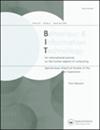Keeping the gates closed: the effect of conflict management styles, anxiety, and technical skills on security noncompliance intention among smartphone users
IF 2.9
4区 管理学
Q2 COMPUTER SCIENCE, CYBERNETICS
引用次数: 0
Abstract
Using personal mobile phones for work-related purposes is an increasingly common trend in organisations yet adding to cyber security concerns. It is vital to identify employees’ characteristics tha...关上大门:冲突管理方式、焦虑和技术技能对智能手机用户不遵守安全规定意愿的影响
将个人移动电话用于与工作相关的目的在企业中越来越普遍,但却增加了网络安全问题。识别员工在工作中使用手机的特点至关重要。
本文章由计算机程序翻译,如有差异,请以英文原文为准。
求助全文
约1分钟内获得全文
求助全文
来源期刊

Behaviour & Information Technology
工程技术-计算机:控制论
CiteScore
7.70
自引率
8.10%
发文量
159
审稿时长
5 months
期刊介绍:
Behaviour & Information Technology (BIT) puts people before technology. As such it deviates from other related journals. It is the primary scientific venue for peer-reviewed publications on human-centred IT.
BIT reports original research studies, practical case studies, and thoughtful articles on:
• usability and user experience (UX)
• human computer interaction (HCI)
• human-centred and user-centred design
• the social, business and human aspects of the digital world.
The Journal attracts authors and readers from a variety of disciplines (e.g., usability, user experience, psychology, ergonomics, computer science, and sociology), originating from both academics and industry.
All papers are subject to initial appraisal by the Editor, and, if found suitable for further consideration, will undertake rigorous double blind peer review by independent, anonymous expert referees.
 求助内容:
求助内容: 应助结果提醒方式:
应助结果提醒方式:


